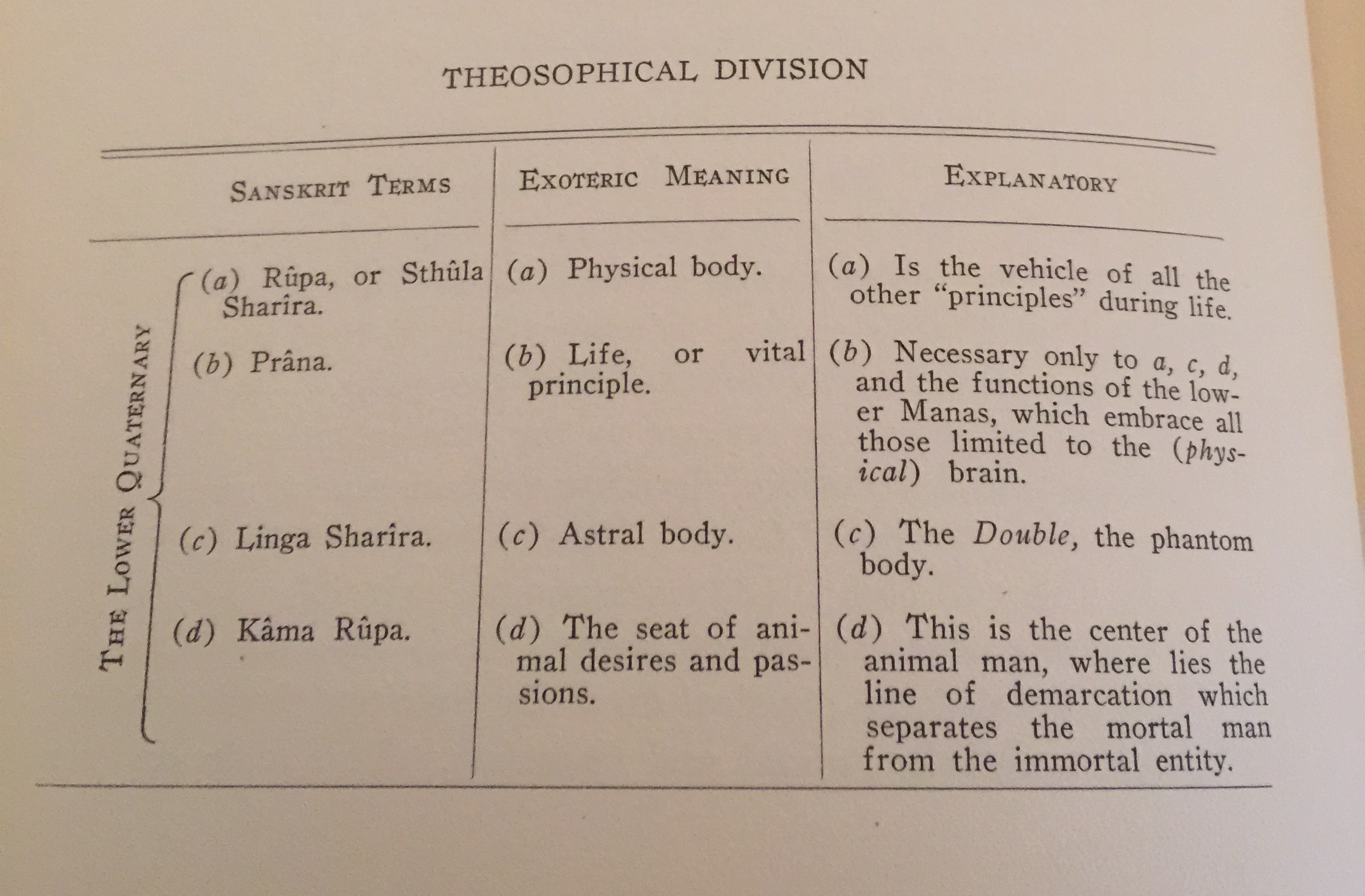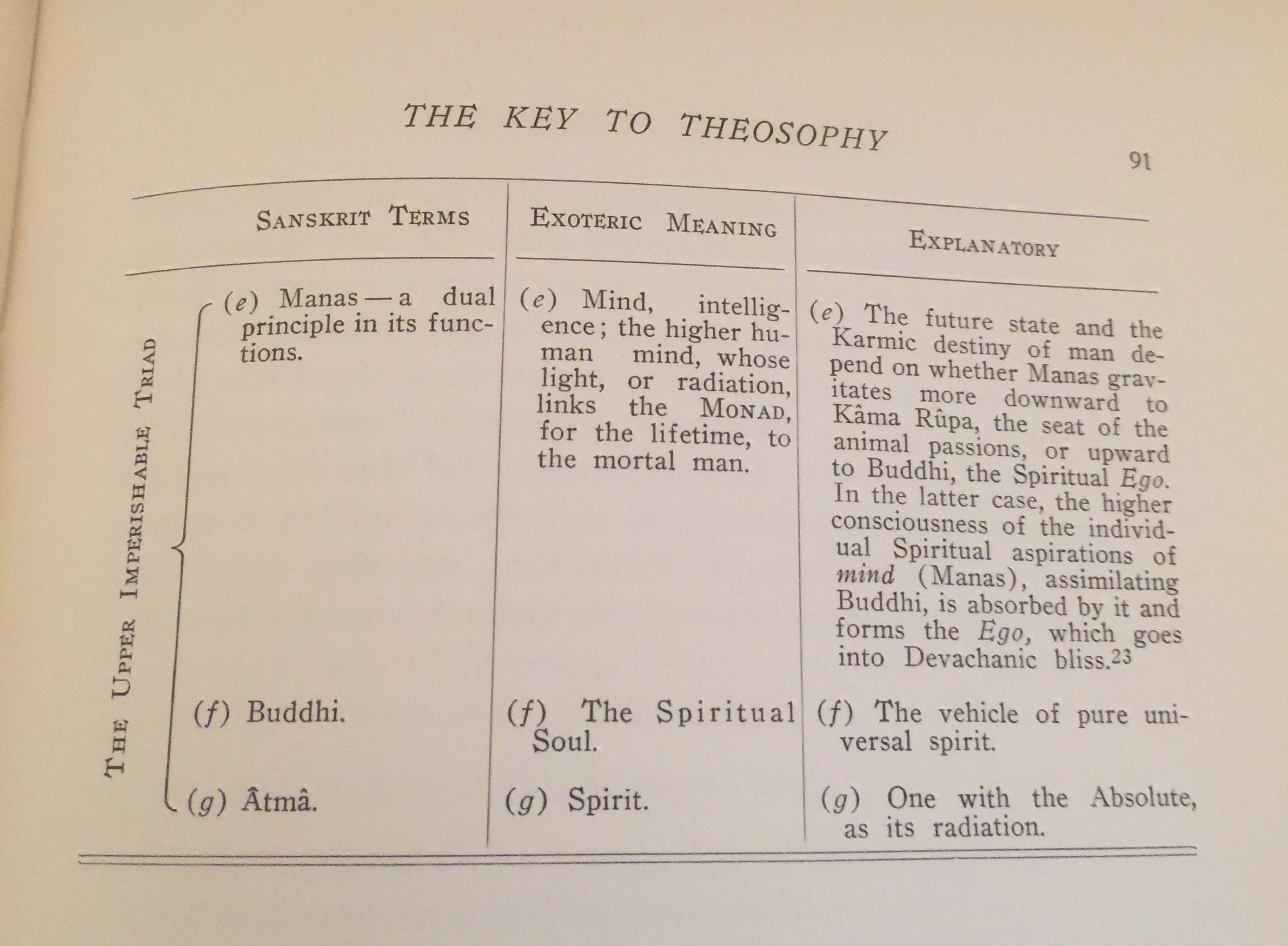It looks like you're using an Ad Blocker.
Please white-list or disable AboveTopSecret.com in your ad-blocking tool.
Thank you.
Some features of ATS will be disabled while you continue to use an ad-blocker.
share:
a reply to: Voyager1
Hello again my Brother. If you are at peace, content, and happy with your life and current routine, you do not need to endeavor into the study of matters that may consume your time and/or feel burdensome. If you cultivate more positive than negative within yourself, and manifest more positive than negative into the outer world, you are well on the right track.
a reply to: artistpoet
The subject matter and literature studies of Theosophy is a challenge to the religious institutional monopolies. The self-empowerment found in self-realization and divine gnosis is a challenge to repressive groups and regimes. It's no wonder that Blavatsky and the Theosophical Society has been so long been demonized.
Hello again my Brother. If you are at peace, content, and happy with your life and current routine, you do not need to endeavor into the study of matters that may consume your time and/or feel burdensome. If you cultivate more positive than negative within yourself, and manifest more positive than negative into the outer world, you are well on the right track.
a reply to: artistpoet
The subject matter and literature studies of Theosophy is a challenge to the religious institutional monopolies. The self-empowerment found in self-realization and divine gnosis is a challenge to repressive groups and regimes. It's no wonder that Blavatsky and the Theosophical Society has been so long been demonized.
The Theosophical teaching that there are seven planes of consciousness has received mathematical proof by being shown to be mathematically encoded in
the geometry of the Kabbalistic Tree of Life (Otz Chiim). See here and following
pages.
It has also been shown to be represented in analogical form in the amazing geometry of the disdyakis triacontahedron (the polyhedral version of the Tree of Life) - see here - in the Tantric Sri Yantra (see here) and in the five Platonic solids (see here).
Here in these sacred geometries is irrefutable, mathematical evidence supporting this teaching of Blavatsky, developed later by Annie Besant & C.W. Leadbeater.
It has also been shown to be represented in analogical form in the amazing geometry of the disdyakis triacontahedron (the polyhedral version of the Tree of Life) - see here - in the Tantric Sri Yantra (see here) and in the five Platonic solids (see here).
Here in these sacred geometries is irrefutable, mathematical evidence supporting this teaching of Blavatsky, developed later by Annie Besant & C.W. Leadbeater.
a reply to: micpsi
Experiential accounts of, and research into non-local consciousness, seems to be edging science closer to the esoteric.
Here's H.P.B.'s basic ground-work for the 7-Fold Nature of Man:
Experiential accounts of, and research into non-local consciousness, seems to be edging science closer to the esoteric.
Here's H.P.B.'s basic ground-work for the 7-Fold Nature of Man:
The Septenary Nature of Man
INQUIRER. Is it what we call Spirit and Soul, and the man of flesh?
THEOSOPHIST. It is not. That is the old Platonic division. Plato was an Initiate, and therefore could not go into forbidden details; but he who is acquainted with the archaic doctrine finds the seven in Plato's various combinations of Soul and Spirit. He regarded man as constituted of two parts-one eternal, formed of the same essence as the Absoluteness; the other mortal and corruptible, deriving its constituent parts from the minor "created" Gods. Man is composed, he shows, of (1) A mortal body, (2) An immortal principle, and (3) A "separate mortal kind of Soul." It is that which we respectively call the physical man, the Spiritual Soul or Spirit (nous), and the animal Soul (psuche). This is the division adopted by Paul, another Initiate, who maintains that there is a psychical body which is sown in the corruptible (astral soul or physical body), and a spiritual body that is raised in incorruptible substance. Even James corroborates the same by saying that the "wisdom" (of our lower soul) descendeth not from the above, but is terrestrial "psychical," "demoniacal," (vide Greek text), while the other is heavenly wisdom. Now, so plain is it that Plato and even Pythagoras, while speaking but of three principles, give them seven separate functions in their various combinations, that if we contrast our teachings this will become quite plain.
Now what does Plato teach? He speaks of the interior man as constituted of two parts -- one immutable and always the same, formed of the same substance as Deity, and the other mortal and corruptible. These two parts are found in the upper Triad and the lower Quaternary of our table. He explains that when the Soul, (psuche) "allies herself to the nous (divine spirit or substance), she does everything aright and felicitously;" but the case is otherwise when she attaches herself to anoia (folly, or the irrational animal Soul). Here, then, we have Manas, or the Soul in general, in its two aspects: when attaching itself to anoia (our Kama Rupa, or the "animal soul," as sometimes described) it runs towards entire annihilation, as far as the personal Ego is concerned; when allying itself to the nous ( Atma-Buddhi) it merges into the immortal, imperishable Ego, and then its spiritual consciousness of the personal that was, becomes immortal.
- H.P.B., "The Key to Theosophy", Pages 89-92
edit on 1/10/16 by Sahabi because: The last sentence of my previous post should have read: "It's no wonder that Blavatsky and the Theosophical
Society has so long been demonized."
a reply to: Sahabi
I started reading The Secret of the Doctrine, but on a laptop in pdf format, I was very attracted to the book, but I stopped reading until I bought the right one, it's hard to read over a thousand pages in this way.
I have a question in a couple of places I read that Secret Doctrine 3 (at least in my country is the third book, maybe you do not) occultism should not read just about everyone, they did not give any specific reasons.
It's a bit strange for me to recommend the first and second part and the third not, I don't know maybe they have a reason why, I didn't find anyone to explain why, honestly I didn't search to much since I already decided to buy all 3 books.
I guess maybe you know something about is there's a reason why or they're talking nonsense.
I started reading The Secret of the Doctrine, but on a laptop in pdf format, I was very attracted to the book, but I stopped reading until I bought the right one, it's hard to read over a thousand pages in this way.
I have a question in a couple of places I read that Secret Doctrine 3 (at least in my country is the third book, maybe you do not) occultism should not read just about everyone, they did not give any specific reasons.
It's a bit strange for me to recommend the first and second part and the third not, I don't know maybe they have a reason why, I didn't find anyone to explain why, honestly I didn't search to much since I already decided to buy all 3 books.
I guess maybe you know something about is there's a reason why or they're talking nonsense.
Post Removed By Staff
edit on 12/6/2021 by semperfortis because: (no reason given)
edit on Thu Dec 23 2021 by DontTreadOnMe because: (no reason given)
SPAM
edit on 1/1/2022 by semperfortis because: (no reason given)
new topics
-
Is Taco Bell Satanic?
Education and Media: 1 hours ago -
Scientists Find 7 potential Dyson spheres after Scanning 5 million Objects
Space Exploration: 2 hours ago -
Need help understanding the evolution of WHO as a power structure. Shades of the NWO...?
New World Order: 4 hours ago -
The geography of Eden
Religion, Faith, And Theology: 5 hours ago -
US 'Uniparty' officially throws Christians to the lions...
Conspiracies in Religions: 6 hours ago -
REAL ID now a reality
General Conspiracies: 8 hours ago -
'I couldn't cope with Britain anymore': Kurdish man pays smuggler to return him to France
Social Issues and Civil Unrest: 10 hours ago
top topics
-
Oh, Have I got a Goody for You Guys!!!
General Conspiracies: 15 hours ago, 20 flags -
Former Hamas member goes OFF on ‘low grade’ lefty journalist
US Political Madness: 13 hours ago, 14 flags -
Woman In Her 60s Stabbed To Death In London Street By Thief Who Tried To Steal Her Bag.
Social Issues and Civil Unrest: 16 hours ago, 8 flags -
REAL ID now a reality
General Conspiracies: 8 hours ago, 6 flags -
'I couldn't cope with Britain anymore': Kurdish man pays smuggler to return him to France
Social Issues and Civil Unrest: 10 hours ago, 4 flags -
Scientists Find 7 potential Dyson spheres after Scanning 5 million Objects
Space Exploration: 2 hours ago, 3 flags -
An Apple a Day
General Chit Chat: 13 hours ago, 2 flags -
US 'Uniparty' officially throws Christians to the lions...
Conspiracies in Religions: 6 hours ago, 2 flags -
The geography of Eden
Religion, Faith, And Theology: 5 hours ago, 1 flags -
Need help understanding the evolution of WHO as a power structure. Shades of the NWO...?
New World Order: 4 hours ago, 1 flags
active topics
-
Scientists Find 7 potential Dyson spheres after Scanning 5 million Objects
Space Exploration • 17 • : BeyondKnowledge3 -
Is Taco Bell Satanic?
Education and Media • 9 • : Caver78 -
Mood Music Part VI
Music • 3168 • : lilzazz -
Multipal Solar Storms Coming Our Way This Weekend
Fragile Earth • 24 • : NorthOS -
-@TH3WH17ERABB17- -Q- ---TIME TO SHOW THE WORLD--- -Part- --44--
Dissecting Disinformation • 937 • : daskakik -
REAL ID now a reality
General Conspiracies • 23 • : Euronymous2625 -
Candidate TRUMP Now Has Crazy Judge JUAN MERCHAN After Him - The Stormy Daniels Hush-Money Case.
Political Conspiracies • 1479 • : matafuchs -
Oh, Have I got a Goody for You Guys!!!
General Conspiracies • 55 • : boatguy12 -
Kirkpatrick vs Fugal - Skinwalker ranch briefing.
Aliens and UFOs • 29 • : network dude -
Need help understanding the evolution of WHO as a power structure. Shades of the NWO...?
New World Order • 1 • : NorthOS


